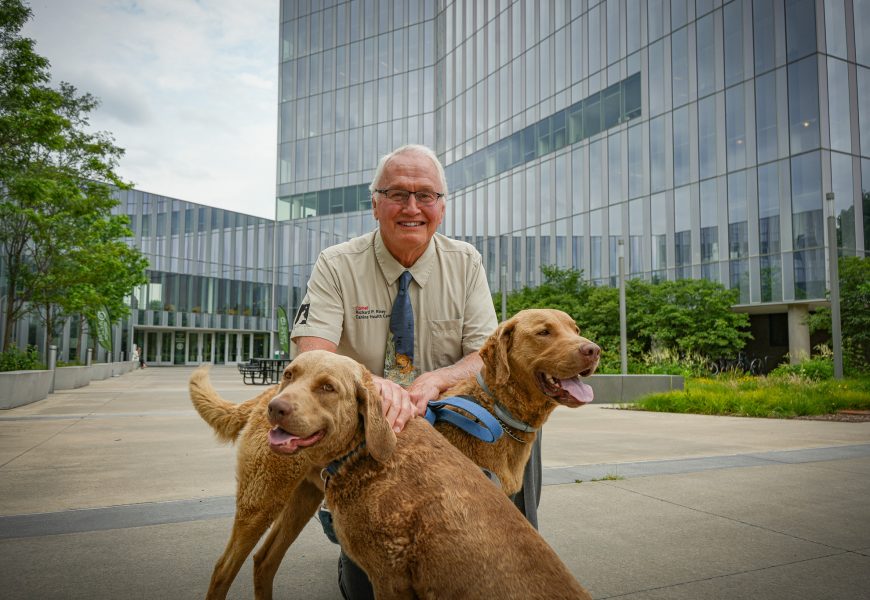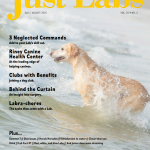by Paula Piatt
Back in the day,” veterinarians would walk the halls at the Cornell University College of Veterinary Medicine with fistfuls of pink telephone memo slips, each with a question phoned in by a pet owner looking for advice – my dog isn’t eating, it’s limping on its front leg, do I need to bring him in to see a vet? When they had time, they’d answer the public’s questions, returning the phone call, listening to the patient’s history, and offering what advice they could with what little they had to go on.
Just imagine that. Fistfuls of pink notes.
Finding information in this day and age is easy – finding reputable information, not so much. Dr. Google treats many a human patient today; it’s not far-fetched to think he treats their pets, as well.
So when a $30 million gift from the Richard P. Riney Family Foundation came along to “support far-ranging research initiatives that may help dogs live their best lives,” it also funded a public outreach program to get those research results out to the public in a way that would help with the center’s mission of “improving the lives of dogs, helping them lead longer, healthier and happier lives.”
“We know people rely on the internet, so we want to provide current and relevant information and provide it in a way they can understand,” says Dr. Rory Todhunter, the Riney Canine Health Center’s inaugural director, of the hundreds of articles and videos on the center’s website.
They no longer walk the halls with those pink slips, but two extension veterinarians – Dr. Brian Collins and Dr. Aly Cohen – answer pet parents’ questions, pen blogs and articles, appear in videos and on podcasts, and interact with the media, serving as the public face of the Center and bringing that research to the public.
The center’s website is home to a searchable database of more than 250 articles and a series of YouTube Canine Health Minutes, with topics ranging from brushing your dog’s teeth to spotting running-related injuries. You’ll find Riney on social media and as a faculty member contributing to Cornell DogWatch, a monthly printed newsletter full of health information. Community outreach initiatives have included online offerings (webinars on understanding canine genetics) and in-person events (an advanced first-aid clinic for hunting dogs).
“We didn’t have any web presence and people were, essentially, doing what they had done before, which is googling. Or they were just coming into the hospital and hoping a faculty member would answer their questions,” said Dr. Todhunter. “The whole goal here and now is to provide the latest, up-to-date information.”
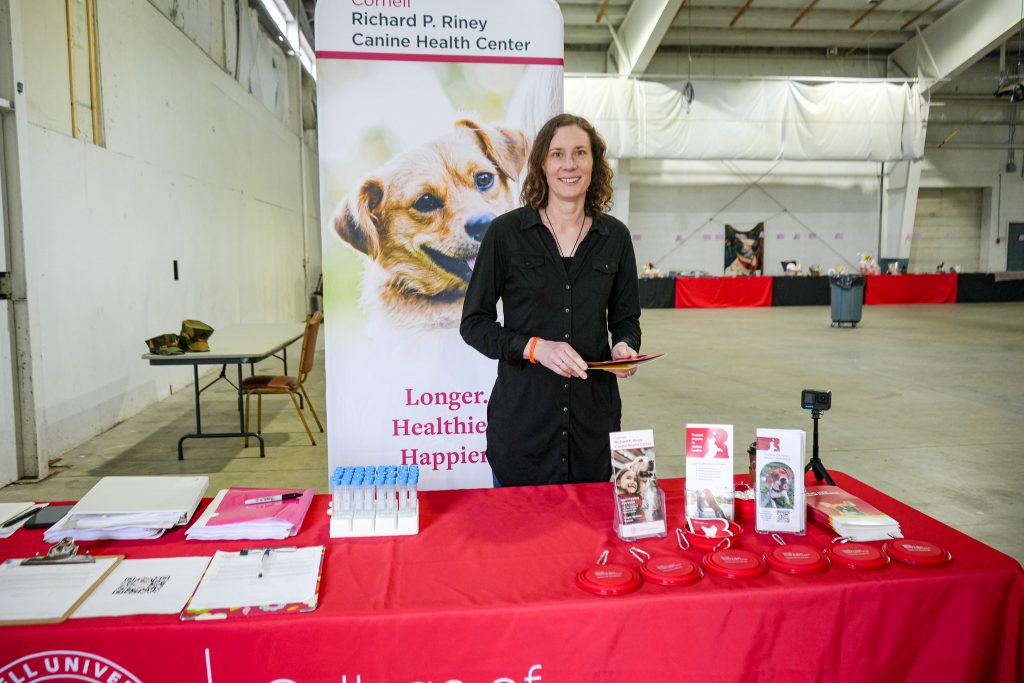
The center’s latest innovation is the Big Red Bark Chat, a research-based AI tool. A quick question to the chatbot begins a conversation that leads to reliable answers to canine health questions. The closed AI model – a partnership with the college’s IT department and Amazon Web Service’s Generative AI unit – searches only the Cornell database and not the larger internet, as say, a ChatGPT tool would.
It first looks through the Riney Center’s article index; then searches Cornell’s Consultant website, a veterinary diagnostic support site that searches by diagnosis, signs, and symptoms; and finally, it will search recent faculty lectures for information on the topic. For those new to the chatbot format, the site offers tips about framing questions and encourages dialogue. In its answer, the Big Red Bark Chat includes possible causes, when to be concerned, what your vet might look for, what you should watch for, and next steps you should take. It also provides links to the references it used to generate the answers.
It’s not a substitute for your veterinarian, says Dr. Todhunter, but it’s still a valuable tool to break down barriers to trusted information and advice.
“We can’t make a diagnosis, we’re not seeing the patient, but this is our best advice at the moment,” he says of the targeted search tool, which will always suggest you see your veterinarian. “The problem is, of course, not everybody can get to a vet. There are not enough specialists, there’s not enough of anything now.”
Fueling the Big Red Bark Chat, the website, and public outreach is the research – the heart of the Riney Canine Health Center. It brings together 60 or more faculty and researchers from six academic departments, Cornell’s Baker Institute for Animal Health and Animal Health Diagnostic Center, as well as the veterinary medical center.
By investing the Riney endowment, the Center funds a half dozen or so projects each year that may otherwise never get off the ground. Limited external grants are very competitive, and internally, canine research is competing for Cornell funding.
Were it not for the endowment, “I would say less than half the grants would have been funded because we were competing with other species,” said Dr. Todhunter. Potential projects are vetted by the university’s College Research Council; the top scoring canine proposals are then funded by Riney. Since 2022, the Center has funded research on a wide range of topics: therapies for treatment of bone cancer, diagnostic testing for hemangiosarcoma, a skin sensor for diabetic monitoring, understanding pain pathways, and understanding the spread of canine flu.
Some studies have been breed specific, but much of the work supported by Riney benefits “any dog that walks through the door,” says Dr. Todhunter, who has owned and studied Labradors for years and has a soft spot for the breed. A foremost expert in canine hip dysplasia, he co-led a comprehensive genetic study in the early 2000s of 140 Labs (see Just Labs September/October 2010), which is still bearing fruit today. His appointment as the Center’s first director came following a distinguished orthopedic surgical career at Cornell, and he still spends time in the research lab, continuing to look for genetic disease markers in Labs and golden retrievers.
Four years and $2.2 million after Riney’s founding, Dr. Todhunter doesn’t hesitate when asked about one of the Center’s most impactful research projects.
“Oral cancer in dogs is a devastating disease,” he says. “If it’s not primarily in the bone, it eventually affects the bone, and the only treatment to date has been surgery.” That surgery, often extensive, greatly impacts the dog’s quality of life.
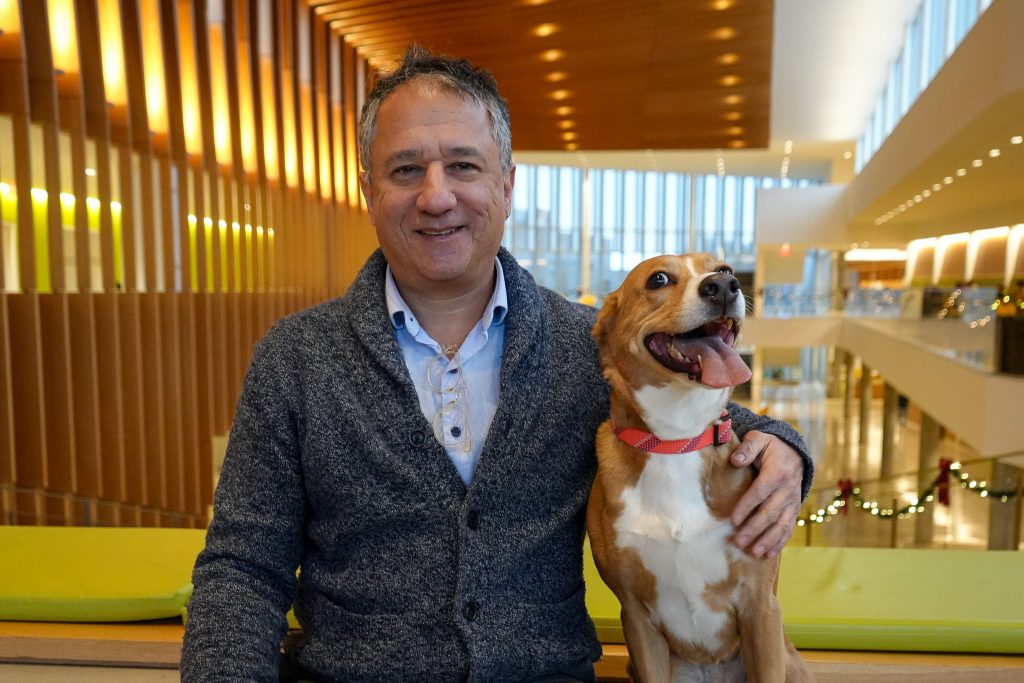
Dr. Santiago Peralta, DVM, an associate professor of dentistry and oral surgery, and William Katt, a senior research associate in molecular medicine, have been working to understand the mechanisms of oral squamous cell carcinoma, looking for ways to shrink the tumors, allowing surgery to be much less invasive.
“From the very first [grant] cycle, Riney has been supporting our work. We have learned so much during the last few years and developed so many resources,” said Dr. Peralta. “It’s been really rewarding because we are seeing results that we not only were hoping for, but in fact are a lot better than we thought.”
Through clinical trials (including samples from Labrador retrievers), they’ve discovered an FDA-approved human drug – trametinib – that is “remarkably effective.” In their study, tumor growth was substantially inhibited, with one dog’s tumor disappearing in a matter of weeks. Quick to point out that the breakthrough is not a cancer cure, Dr. Peralta says 40 percent of the 21 tumors treated in the study shrank, meaning a less invasive, less destructive surgery and improved quality of life for the canine patient. It’s also proven to be cost effective, with a month’s worth treatment between $100-$200, depending on the size of the dog.
Over at the Baker Institute for Animal Health, Dr. Jaquelyn Evans is another researcher benefiting from the Center’s grants program. Broadly, her research focuses on canine diseases and their genetic foundations. She’s contributing to the oral cancer study, and other Riney-funded projects are looking at immune-related eye disease, pannus, in German and Belgian shepherd breeds and gum disease in boxers and bulldogs, both of which will identify genetic markers that could benefit other breeds.
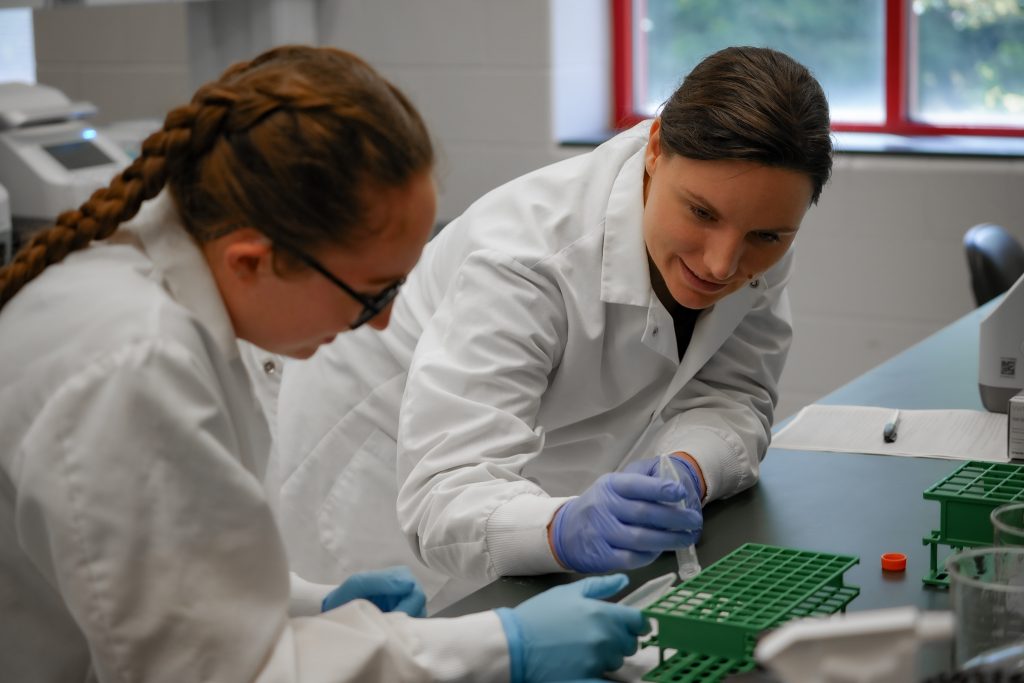
“My research program focuses on improving the health of dogs by identifying genetic risk factors for disease – leading to genetic tests to reduce disease frequency, earlier disease detection, and potentially improved therapies,” says Dr. Evans, the first faculty member supported by the Center. She adds that many canine diseases have human counterparts often caused by the same mutation or mutations in the same genes/pathways. “The information we learn from the dog model may also inform human disease research.”
But while we may ultimately benefit from the research, the Riney Canine Health Center is all about our canine companions and helping owners make good decisions about their health.
More Information
Information provided through the center’s website is free and available to the public, and the research is readily shared with scientists around the world. A Center membership offers, among other things, monthly health tips; a subscription to the DogWatch newsletter; access to special events at Cornell; discounts on DNA testing through its research partner, Embark; and early access to clinical trials being undertaken in the Cornell University Hospital for Animals. More information about the Riney Canine Health Center, its research, and membership are available at www.canine.vet.cornell.edu.

